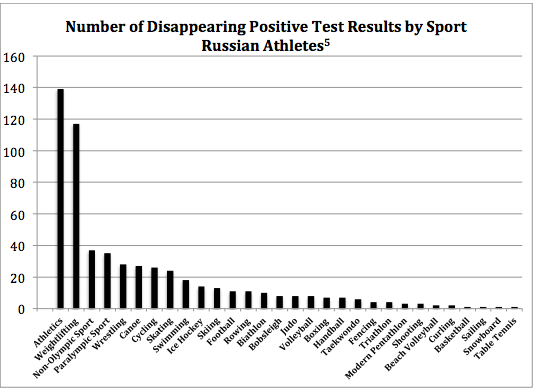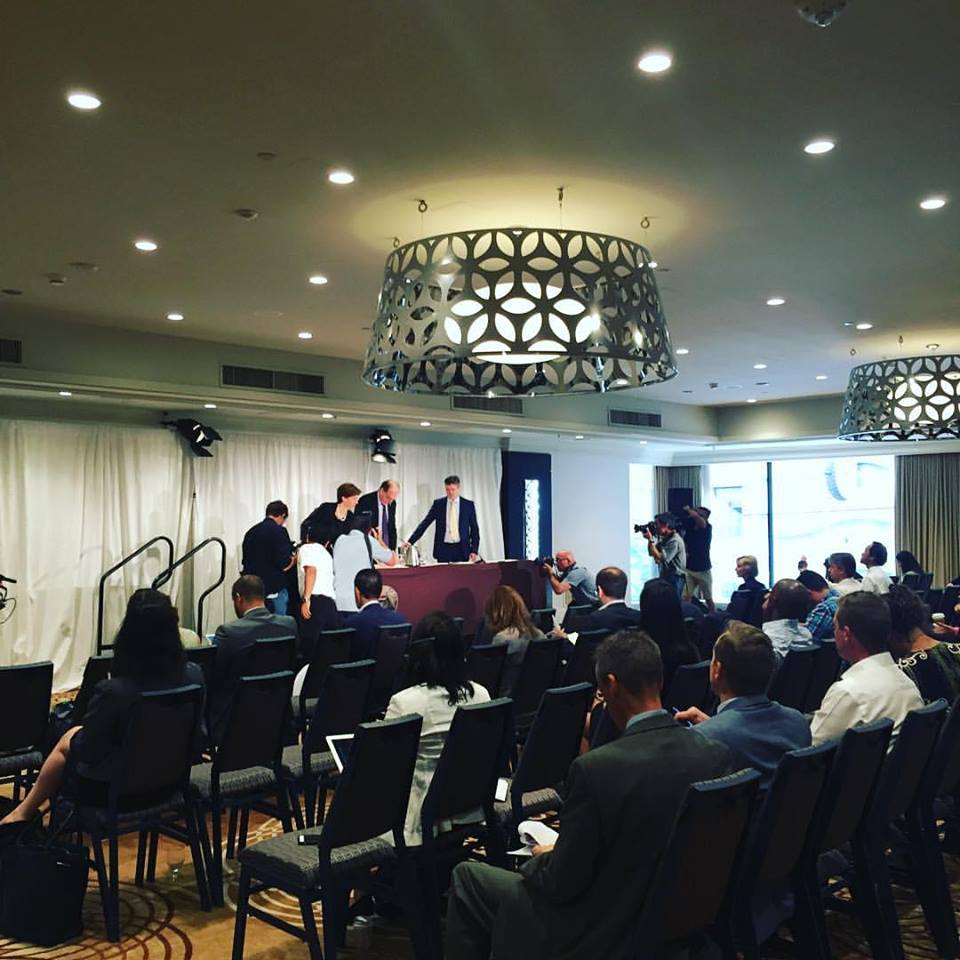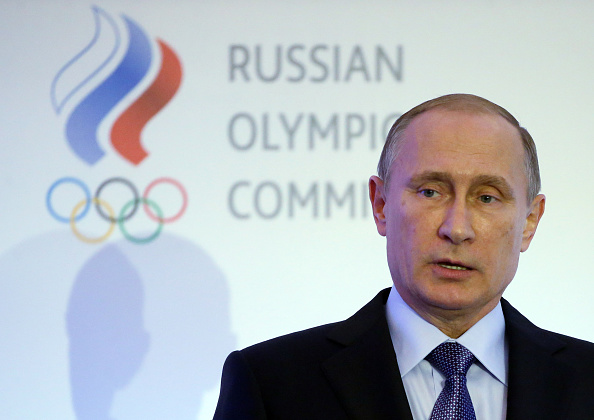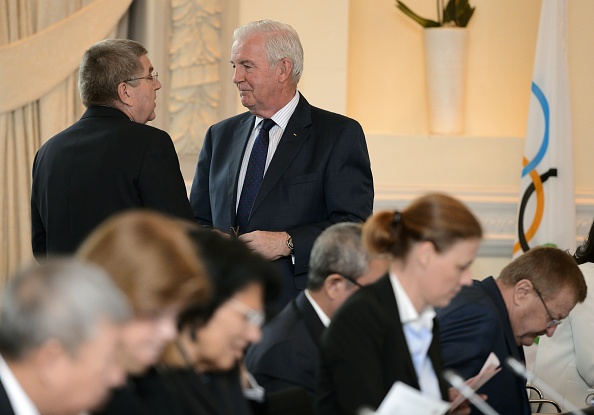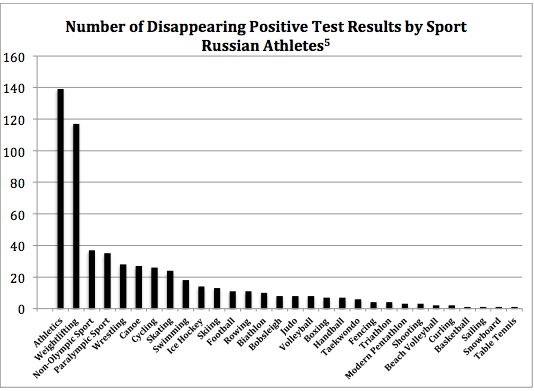The most important note from the compelling report released Monday in a World Anti-Doping Agency-commissioned inquiry into allegations of Russian doping is super-clear and, because of that, all the more striking: there is no recommendation about what, as Lenin might have put it, is to be done.
This means the door has, purposely, been left wide-open for Russian athletes to take part in the 2016 Rio Olympic Games. As they should.
To be clear:
The report, produced by respected Canadian law professor and anti-doping expert Richard McLaren, offers evidence that strongly — reiterate, strongly — suggests the involvement of the Russian state in promulgating a program designed to evade anti-doping controls.
Over its 103 pages, the report offers up a narrative of holes in walls, disappearing positives and more.
But — and this is the key — the report does not tie specific athletes to specific misconduct. At least yet. Without that, it fails law, ethics, morality and common sense to bar anyone from Rio.
The report also — and this is essential, too — asserts, and repeatedly, that the evidence it is offering up is “beyond a reasonable doubt.”
If only that were the case.
Instead, the report is rife with internal contradictions and more that demonstrate in a vivid fashion the glaring conflict in trying to ban anyone on these grounds.
In sum, the McLaren report amounts to a prosecutor’s brief. A solid salvo. He and his team deserve considered respect. And WADA deserves applause for commissioning his inquiry.
Even so:
There has not yet been any sort of cross-examination, in a formal setting under oath, of considerable chunks of the evidence offered up in the report.
Thus calls for bans or more sparked by the McLaren report amount to howling from the mob. Not justice.
The Olympics are better than that.
The Olympics, at the core, are about fair play.
If the argument is that the Russians corrupted that ideal, the response is elemental: two wrongs do not make a right.
Neither the International Olympic Committee's policy-making executive board nor the Swiss-based Court of Arbitration for Sport -- both meeting this week to consider the Russians -- are obliged in any way, shape or form to dish out collective responsibility when every principle of fairness calls out for individual adjudication.
WADA, upon the release of the report, put out a statement urging that Olympic authorities “decline entries” from Russia for Rio. WADA is under intense geopolitical pressure. Such a statement is super-cool PR, enabling WADA to play CYA in advance of reviews from the IOC and CAS.
The close reader will also note the disclaimer in the “preamble” to the WADA statement, from president Craig Reedie. WADA, he expressly notes, “does not have the authority or remit in respect of entries to competitions.”
There are now two probable paths ahead:
One, the IOC president, Thomas Bach, has already done a deal in Russia to effect a ban for one Games. This would, among other things, serve as protection for the next major summertime sports event involving the Russians, the 2018 World Cup.
This seems unlikely.
Putin, in a statement put out Monday by the Kremlin, after noting the 1980s-era boycotts led by the United States of the Moscow Games and, then, in reprisal, by the Soviet Union in 1984 in Los Angeles:
“Today, we see a dangerous return to this policy of letting politics interfere with sport. Yes, this intervention takes different forms today, but the essence remains the same; to make sport an instrument for geopolitical pressure and use it to form a negative image of countries and peoples. The Olympic movement, which is a tremendous force for uniting humanity, once again could find itself on the brink of division.”
If you're going to ban Russia, you might want to ban Kenya while you're at it. Unlikely? If so, how is it remotely fair to ban Russia?
And this: eight years ago, literally during the 2008 Beijing Games, Russia and Georgia fought a brief war. If neither was kicked out of the Games then, and people were actually dying, the IOC would now take the step of implementing a ban (against Russia) because of -- allegations of doping?
Option Two, and far more likely:
The IOC board meeting Tuesday produces rhetoric but no more. CAS issues its decision later this week, perhaps Thursday. The IOC waits after that to “process” (pick your word) everything that’s going on. Then it waits a little bit more. The next thing you know, the IOC says it really needs more information, the sort McLaren makes plain that he has or has access to but has not yet himself processed and, oh, by the way, it’s now too late — see you in Rio, Russians.
One thing that has not been super-cool: the aggressive push from Travis Tygart, head of the U.S. Anti-Doping Agency, and others in the United States and Canada to keep the Russians out.
Their statement over the weekend, calling for a ban on the Russians, suggested — rightly or wrongly — that the McLaren report had been leaked to Tygart, and others, in advance. It had not.
Everyone gets the right, at least in the United States and Canada, to speak their mind. That’s not the issue. The issue is that actions lead to consequence. And — you can believe — many important and influential people in the broader sports movement are irritated, big time, and at Tygart in particular.
It’s not only that such banging-the-drum has not been helpful. Believe it — again — it actually has intensified the risk of seeing happen the exact opposite of what has been asked for.
You can like Putin, or not. Fear the Russian president. Loathe him. Respect him. Whatever. It doesn’t matter. What matters is that Putin is arguably on the top-three list of most important personalities in the Olympic movement. Putin matters. And Russia matters.
More from Putin in Monday’s statement:
“The U.S. Anti-Doping Agency and several anti-doping agencies in other countries, without waiting for the official publication of the World Anti-Doping Agency’s commission, have hastened to demand that the entire Russian team be banned from taking part in the Rio de Janeiro Olympics.
“What is behind this haste? Is it an attempt to create the needed media atmosphere and apply pressure? We have the impression that the USADA experts had access to what is an unpublished report and have set its tone and even its content themselves. If this is the case, one country’s national organization is again trying to dictate its will to the entire world sports community.”
Uh-oh.
Putin goes on to say:
“Russia is well aware of the Olympic movement’s immense significance and constructive force, and shares in full the Olympic movement’s values of mutual respect, solidarity, fairness and the spirit of friendship and cooperation.
“This is the only way to preserve the Olympic family’s unity and ensure international sport’s development in the interest of bringing people and cultures closer together. Russia is open to cooperation on achieving these noble goals.”
Make of that whatever you will. The important thing is that, unprompted, these last two paragraphs also found their way into the Kremlin release.
As Olivier Niggli, the new WADA director general, noted in the agency’s news release: “...senior Russian politicians have started to publicly acknowledge the existnce of longstanding doping practices in Russia, and have conceded that a significant culture change is required.
“The McLaren Report makes it ever more clear that such culture change needs to be cascaded from the very top in order to deliver the necessary reform that clean sport needs.”
That’s going to take time, and money. WADA needs way more than the $26 million a year it gets now, and any number of the roughly 200 nations in the world need to step up big time if the campaign against doping in sports is to become, truly, a priority.
In the meantime, there remains the pressing question: what is to be done?
Thomas Bach, the IOC president, observed a few days ago in an interview with Associated Press and other wire services:
“It is obvious that you cannot sanction or punish a badminton player for infringement of rules or manipulation by an official or lab director in the Winter Games,” the keen student noting that Reedie is a former badminton champion who went on to be president, in the 1980s, of the international badminton federation.
“What we have to do,” Bach said, “is to take decisions based on facts, and to find the right balance between collective responsibility and individual justice. The right to individual justice applies to every athlete in the world.”
Just to take one of many examples from within the McLaren report:
A graph, page 41, shows the number of “disappearing positives” in various sports.
The Russian synchronized swim team is a powerhouse. Is there any mention of synchro on that list? And yet the Russian synchro team should be banned? On what grounds?
Gymastics — where is “gymnastics” on that list? Answer: nowhere.
This is why — shortly after the release of Monday’s report — Bruno Grandi, president of FIG, the international gymnastics federation, put out a statement declaring that clean Russian gymnasts must be allowed to compete in Rio.
He said, ”The rights of every individual athlete must be respected. Participation at the Olympic Games is the highest goal of athletes who often sacrifice their entire youth to this aim. The right to participate at the Games cannot be stolen from an athlete, who has duly qualified and has not be found guilty of doping. Blanket bans have never been and will never be just."
Even McLaren himself, in the report, observes, at page 4, and “IP” in this context refers to McLaren, the “independent person” commissioned by WADA:
“The third paragraph of the IP’s mandate, identifying athletes who benefited from the manipulations, has not been the primary focus of the IP’s work. The IP investigative team has developed evidence identifying dozens of Russian athletes who appear to have been involved in doping. The compressed timeline of the IP investigation did not permit compilation of data to establish an antidoping rule violation. The time limitation required the IP to deem this part of the mandate of lesser priority. The IP concentrated on the other four directives of the mandate.”
Elsewhere, the report asserts, and repeatedly, that evidence rises to meet the law’s most demanding standard, that required for conviction of a criminal case in the United States, “beyond a reasonable doubt.”
Here, a refresher basic: that is for a jury or a tribunal to decide, not the investigator.
Assume, though, that everything in the report is dead-bang true. It's easy to point a finger at "the Russians." It's a little different to say -- more, to prove -- that Igor, or Sasha, or Svetlana, or whoever had his or her sample swapped. Even if you can prove that, does that mean Igor or Sasha was doping? Did he or she know the sample was being swapped?
At page 87 of the report, McLaren notes, "The Moscow Laboratory personnel did not have a choice in whether to be involved in the State-directed system."
By the same logic, did athletes in this system have a "choice" in alleged use of illicit performance-enhancing substances? The report, page 49, details the concoction of a doping cocktail -- the Russians called it "the Duchess" -- that consisted of the steroids oral-turinabol, oxandrolone and methasterone. These were dissolved in alcohol -- Chivas for the men, vermouth for the women -- and swished around the mouth for ready absorption.
It doesn't take much imagination to conjure up a situation in which a Russian coach approaches Igor, Sasha, whoever with a glass of the Duchess and says, more or less, "This is your treatment." In such a situation, would an individual athlete feel he or she had the "choice" to say no?
For sure, whatever is in the system is an athlete's responsibility. This is a fundamental premise of the anti-doping rules. But the rules also now expressly acknowledge that intent to cheat -- or not -- matters, too.
As for further specifics that cut to the credibility of what's at issue:
McLaren “did not seek to interview persons living within the Russian Federation. This includes government officials,” page 8. So the report is deliberately one-sided?
“I am aware,” McLaren writes at page 21 in reference to the principle witness, Dr. Gregoriy Rodchenkov, the former director of the Moscow lab, “that there are allegations made against him by various persons and institutional representatives. While that might impinge on his credibility in a broader context, I do not find that it does so in respect of this report.”
Of course broader allegations might significantly impinge on Rodchenkov’s credibility. That’s another basic. Putin goes on for an entire paragraph in his statement about such allegations. Yet these assertions are not explored in any detail? Moreover, just to play common sense — how is it that Rodchenkov finds himself now in Los Angeles? From what source or sources might he have money to, you know, pay rent and buy dinner?
At page 25-6: “The compressed time frame in which to compile this Report has left much of the possible evidence unreviewed. This Report has skimmed the surface of the data that is available or could be available. As I write this Report our task is incomplete.” By definition, “incomplete” means exactly the opposite of “beyond a reasonable doubt.”
Page 56, and a reference to the FSB, the Russian security service: “… it was not possible to fully determine the role of the FSB in sport and doping. The IP has only gained a glimpse into the FSB’s operations.” A “glimpse” does not make for proof beyond a reasonable doubt.
More of the same at page 59, referring to a specific FSB agent: “Were FSB [agent] Blokhin’s actions approved at the highest level of the FSB and the State? The IP cannot say.”
Without being able to say, there is a hole in this well-meaning report big enough to drive a truck through. About, oh, the size of the tunnel underneath the stadium in Rio from which the athletes enter for the opening ceremony.
See you there, Russian delegation. Behind your red, white and blue Russian flag.

